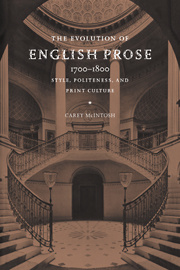Description
The Evolution of English Prose, 1700–1800
Style, Politeness, and Print Culture
Author: McIntosh Carey
A study of the change in English prose from strong oral influence to a new emphasis on formality and precision.
Language: EnglishApproximative price 35.19 €
Subject to availability at the publisher.
Add to cart
Publication date: 10-2005
292 p. · 15.2x22.9 cm · Paperback
292 p. · 15.2x22.9 cm · Paperback
Description
/li>Contents
/li>
Between 1700 and 1800 English prose became more polite and less closely tied to speech. A large scale feminisation of literary and other values coincided with the development of a mature print culture; these two historical trends make themselves felt in the evolution of prose. In this book Carey McIntosh explores oral dimensions of written texts not only in writers such as Swift, Defoe and Astell, who have a strong colloquial base, but also in more bookish writers, including Shaftesbury, Johnson and Burke. After 1760, McIntosh argues, prose became more dignified and more self-consciously rhetorical. He examines the new correctness, sponsored by prescriptive grammars and Scottish rhetorics of the third quarter of the century; the new politeness, sponsored by women writers; and standardisation, which by definition encouraged precision and abstractness in language. This book offers support for a hypothesis that these are not only stylistic changes but also major events in the history of the language.
Preface; 1. The ordering of English; 2. Literacy and politeness: the gentrification of English prose; 3. Testing the model; 4. Loose and periodic sentences; 5. Lofty language and low; 6. Nominal and oral styles: Johnson and Richardson; 7. The new rhetoric of 1748–93; 8. The instruments of literacy; 9. Politeness; feminisation; 10. Style and rhetoric; Epilogue - language change.
© 2024 LAVOISIER S.A.S.
These books may interest you

The Cambridge Companion to Prose 109.06 €




